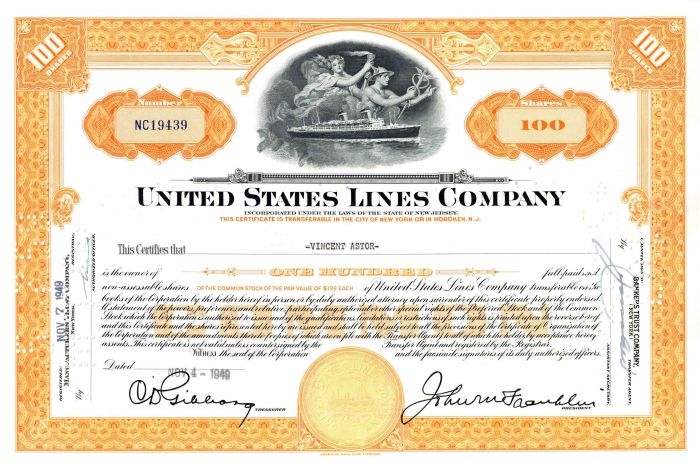William Vincent Astor issued United States Lines Co - Stock Certificate
Inv# AG1283 Stock
Stock Issued to Vincent Astor, not signed. Choice and Attractive 1949 Stock.

William Vincent Astor (November 15, 1891 – February 3, 1959) was an American businessman, philanthropist, and member of the prominent Astor family. Called Vincent, he was born in New York City on November 15, 1891. He was the elder son of John Jacob Astor IV, a wealthy businessman and inventor, and his first wife, Ava Lowle Willing, an heiress from Philadelphia. He graduated in 1910 from St. George's School in Middletown, Rhode Island, and attended Harvard University from 1911 to 1912, leaving school without graduating. Like his father, Astor belonged to the New York Society of Colonial Wars. He served as commodore of the New York Yacht Club from 1928 to 1930.
Astor was interested in trains. In the early 1930s, he established an estate in Bermuda which included a private narrow-gauge railway and union station with the Bermuda Railway. The estate is now divided between several private owners, none of whom are part of the Astor family. As recently as 1992, the remains of some of his rolling stock were visible. Vincent Astor was, according to family biographer Derek Wilson, "a hitherto unknown phenomenon in America: an Astor with a highly developed social conscience." He was 20 when his father died and, having inherited a massive fortune, he dropped out of Harvard University. He set out to change the family's image from that of miserly, aloof slum landlords who enjoyed the good life at the expense of others.
Over time, he sold off the family's New York City slum housing and reinvested in reputable enterprises, while spending a great deal of time and energy helping others. He was responsible for the construction of a large housing complex in the Bronx that included sufficient land for a big children's playground, and in Harlem, he transformed a valuable piece of real estate into another playground for children. Astor appeared at No. 12 on the first list of America's richest people, compiled by Forbes magazine. His net worth at the time was estimated at $75 million. Among his holdings was Newsweek magazine, and he was its chairman. The magazine had for a time its headquarters in the former Knickerbocker Hotel, which had been built by his father. Read more at https://en.wikipedia.org/wiki/Vincent_Astor
United States Lines was the trade name of an organization of the United States Shipping Board (USSB), Emergency Fleet Corporation (EFC) created to operate German liners seized by the United States in 1917. The ships were owned by the USSB and all finances of the line were controlled by the EFC. Among the notable ships of this period was Leviathan, a contender for largest ship in the world for a time. Eventually the line was sold and went private to continue operating as a transatlantic shipping company that operated cargo services from 1921 to 1989, and ocean liners until 1969—most famously, United States.
United States Lines was the trade name of the United States Shipping Board's Emergency Fleet Corporation (EFC) organization created to operate the large German liners seized by the United States in 1917. By 1925 the corporation operated ex-German liners Leviathan, George Washington, America, Republic and the USSB built ships President Roosevelt and President Harding in service between New York and Europe. On 15 November 1921 the line began operating from piers 3 and 4 at the USSB's Hoboken Terminal which had been the Hamburg America Line facilities in Hoboken, New Jersey seized by the United States and, during the war, operated by the Army as the Hoboken Port of Embarkation. The USSB engaged in advertising of the line and its ships through agencies using a "coupon" system to collect names and addresses of interested persons for direct mailings. All the line's funds were managed by the USSB Treasurer. Read more at https://en.wikipedia.org/wiki/United_States_Lines
A stock certificate is issued by businesses, usually companies. A stock is part of the permanent finance of a business. Normally, they are never repaid, and the investor can recover his/her money only by selling to another investor. Most stocks, or also called shares, earn dividends, at the business's discretion, depending on how well it has traded. A stockholder or shareholder is a part-owner of the business that issued the stock certificates.









Ebay ID: labarre_galleries